Plex: 16 August 2023
Collaborative Ecosystem Directory; A Message From Van Gogh’s Bedroom; The Foundational Fractal for Wellbeing; What I Saw Around Town; Will We Survive This? Climate: Logic and Imagination Together; Chronicles of Change; Put All Your Attention on the Throughline; Dare Not to Compare; mmwire ’96

The Biweekly Plex Dispatch is an inter-community newspaper published by Collective Sense Commons on first and third Wednesdays of each month. Price per issue: 1 USD, or your choice of amount (even zero).
In This Issue
- Collaborative Ecosystem Directory (Wendy McLean and Vincent Arena)
- A Message From Van Gogh’s Bedroom (George Pór)
- The Foundational Fractal for Wellbeing (Ken Homer)
- What I Saw Around Town (Ken Homer)
- Will We Survive This? (Ken Homer)
- Climate: Logic and Imagination Together (Douglass Carmichael)
- Chronicles of Change (Ken Homer and Peter Kaminski)
- Put All Your Attention on the Throughline (h/t Charles Blass)
- Dare Not to Compare (Todd Hoskins)
- mmwire ’96 (h/t Charles Blass)
Collaborative Ecosystem Directory is About to Launch - Here’s a Sneak Peek!
by Wendy McLean and Vincent Arena
We have been hard at work for many months on an upgrade of Catalist, to better enable a tech-supported and collaborative community map. And, we finally have something to share!
For those who are not familiar, the original map was created in Miro and drew some attention for its focus on the people, its colorful connections and the breadth of objects (link to Miro; to pdf). Toward a Collaborative Ecosystem is now much closer to living up to its name.
To become collaborative not just in what a map is designed to show but also in the opportunities to engage with each other, the ecosystem’s directory has gone digital! We have synced the data, curated additional content from the web, created a new objects database, tagged everything with layers of attributes, and updated features. We are now so close to giving you access, but a few more details need to be ironed out. In the meantime, we couldn’t wait to share a sneak peek... Here’s a preview of what is to become available in the next month or so!
- The public Collaborative Ecosystem Directory in Card view - where every person, project, group, organization and resource shown in the original Miro has a card. The Directory can be sorted and searched in many ways. Each card can be opened for more details. With a profile, you can bookmark, favorite, like items to your dashboard.
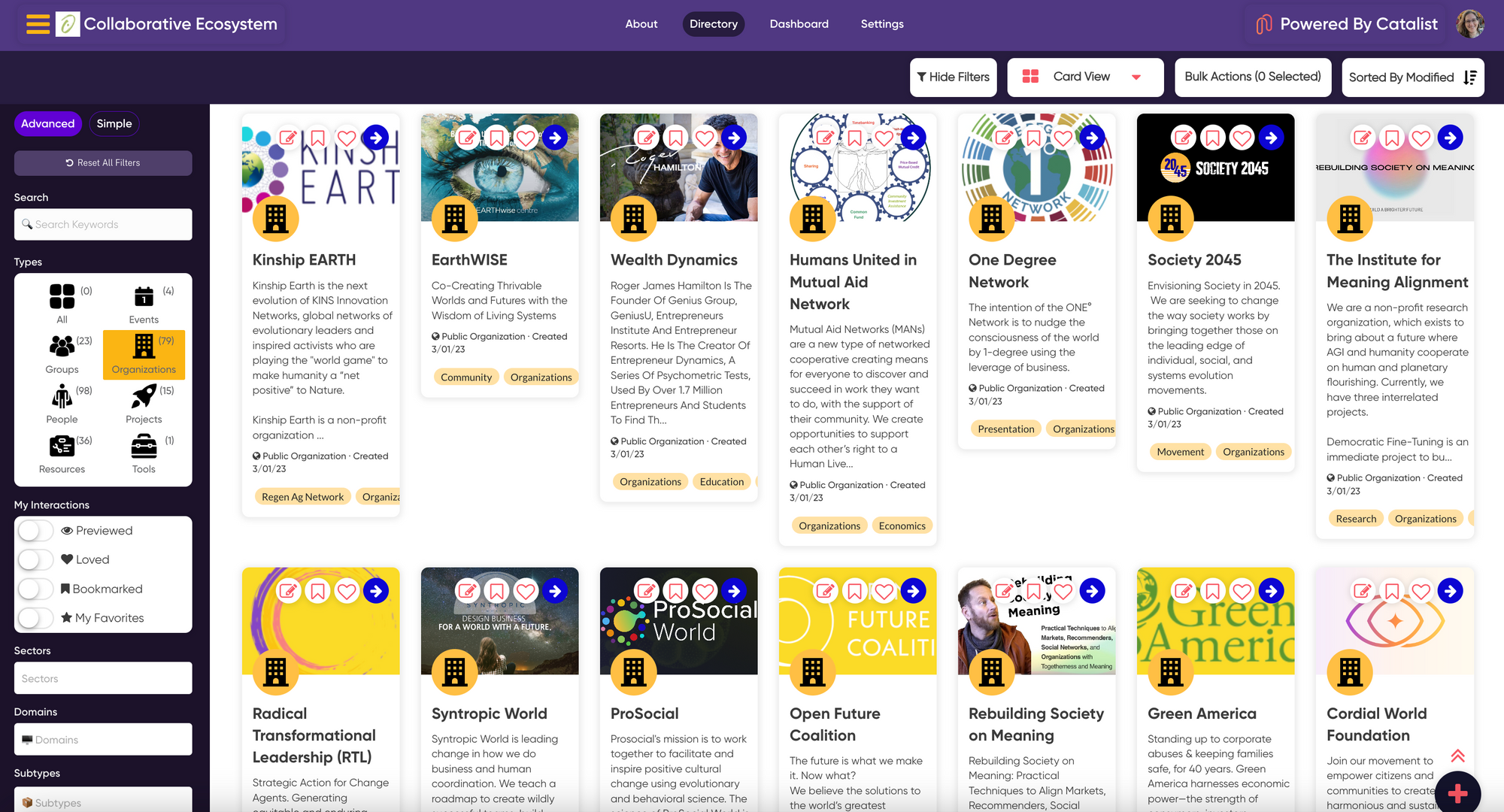
- The public Collaborative Ecosystem Directory in Tapestry view - where all the same data in the Card view has been tagged and sorted by sectors (from the Wheel of Co-Creation), allowing us all to see synergies and gaps in our collective efforts. Every circle represents an object and can be viewed, same as the cards. In addition, the column headers and row titles can be selected, showing a list of all objects in their respective section. And, the design of the table is customizable, allowing you to view the objects by other data types or sector sets.
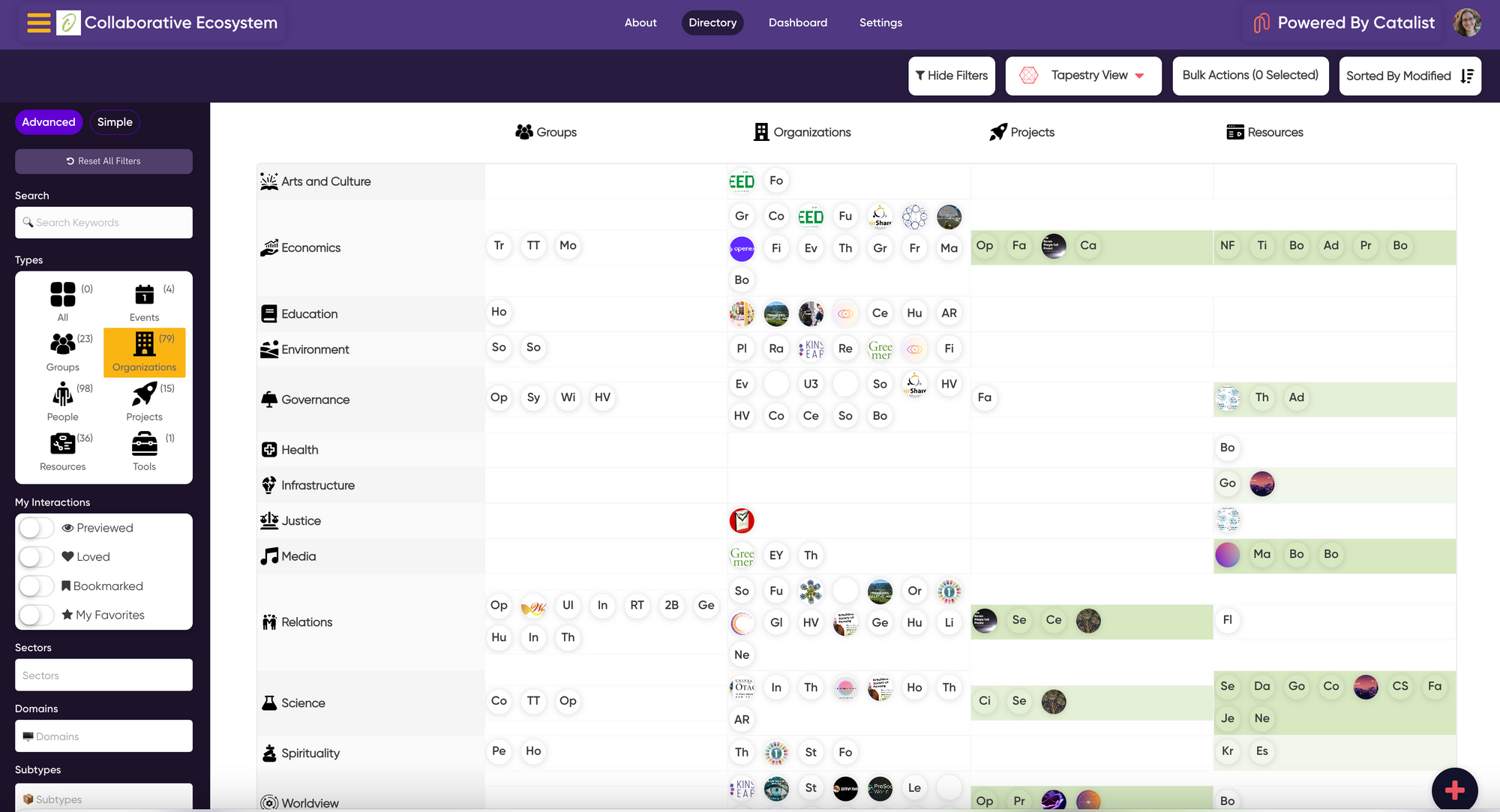
- BONUS! The public Collaborative Commons - This begins our effort to create a collaborative knowledge network, seeded with 72 resources so far, curated with this community in mind. Nearly all of the objects here are ‘outside’ of the Ecosystem shown above, allowing (for now) a clear separation for the sensemaking and weaving to come (more on that in the future).
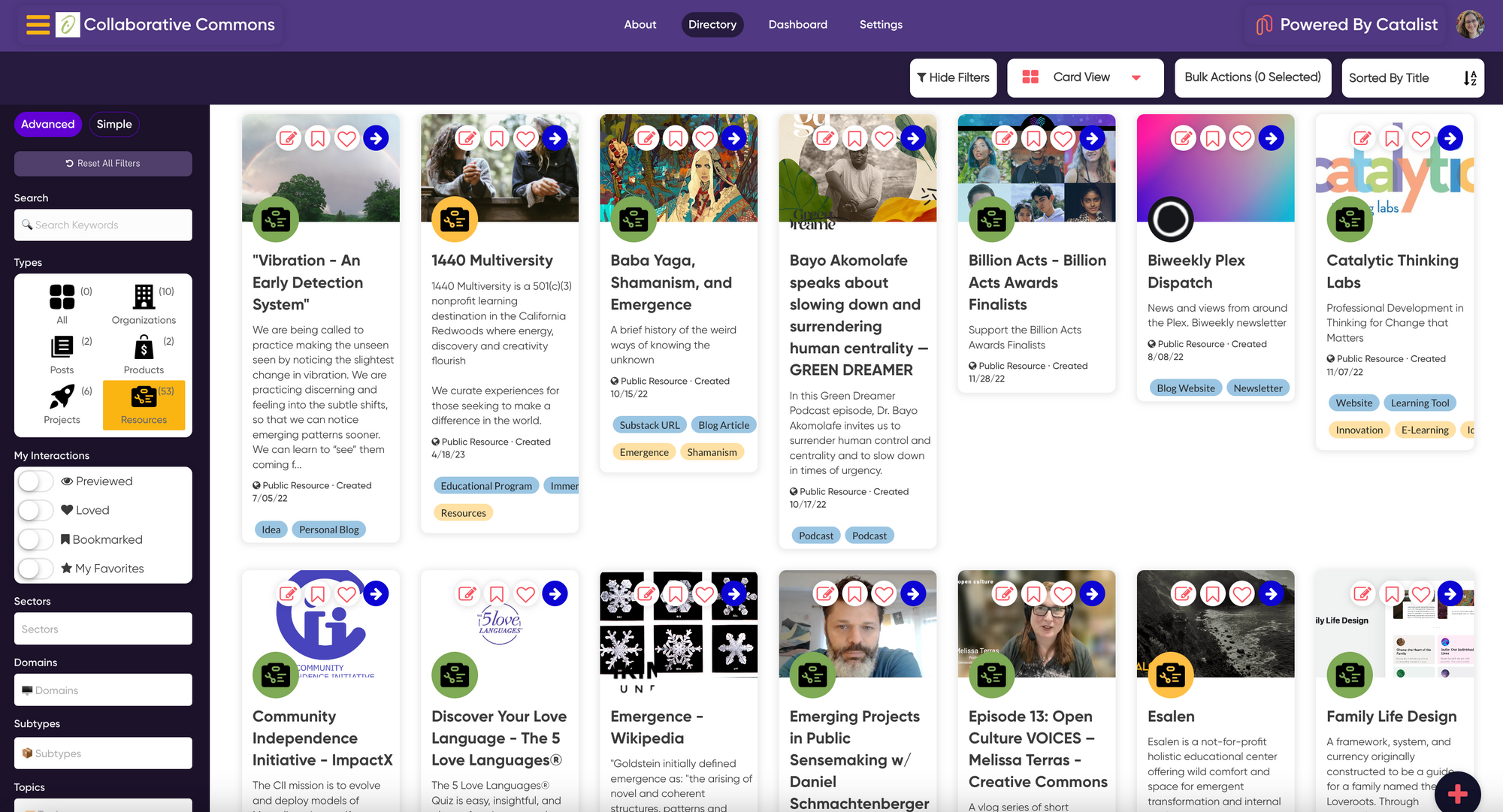
What’s next? We will soon be inviting you to explore the objects, views, functionality and customization built into these space(s). We will also be encouraging you to claim your pieces, make edits and additions as you like, and set privacy on your objects. A few weeks after that, we can all begin weaving connections between any two objects in the ecosystem or commons. After which, our connections will make new mind maps possible, like Kumu. And with that, we’ve come full circle! We’ve come back to a collaborative map, only now it’s responsive, flexible, and scalable.
That’s it for now! We hope you are as excited as we are! If you want to add yourself to Wendy’s email list for direct updates, please fill out this quick google form. Otherwise, please check the Plex for the next announcement! This is just the beginning!
A Message From Van Gogh’s Bedroom
To Budding Ai Shamans, With Love
by George Pór
If you’re a fan of our global mind (a.k.a. noosphere) like me, chances are that you enjoy playing with big, complex thoughts. What I enjoy more is tethering them to soil or soul, something where their complexity can grow life. What I enjoy even more are the moments when I don’t have to do the tethering because it is occurring spontaneously.
Such was the moment, earlier this week, when I visited the Van Gogh Alive immersive show in the Brighton Dome, as I was sitting in Van Gogh’s bedroom recreated by the show’s curators. The big, complex thought was Daniel Schmachtenberger’s Advancing Human Sovereignty that I fell in love with 6 years ago, and its relationship with AI whispering and AI shamanism. But what does all that have to do with Van Gogh?
Did I sufficiently tickle your curiosity bone? If yes, head over to Medium, where you can read my article From Van Gogh’s bedroom to budding AI shamans, with love.
If you like it, don’t resist the temptation to post some comments and questions and sprinkle some love on it in the form of a couple of claps at the bottom of the page.
What I Saw Around Town
by Ken Homer
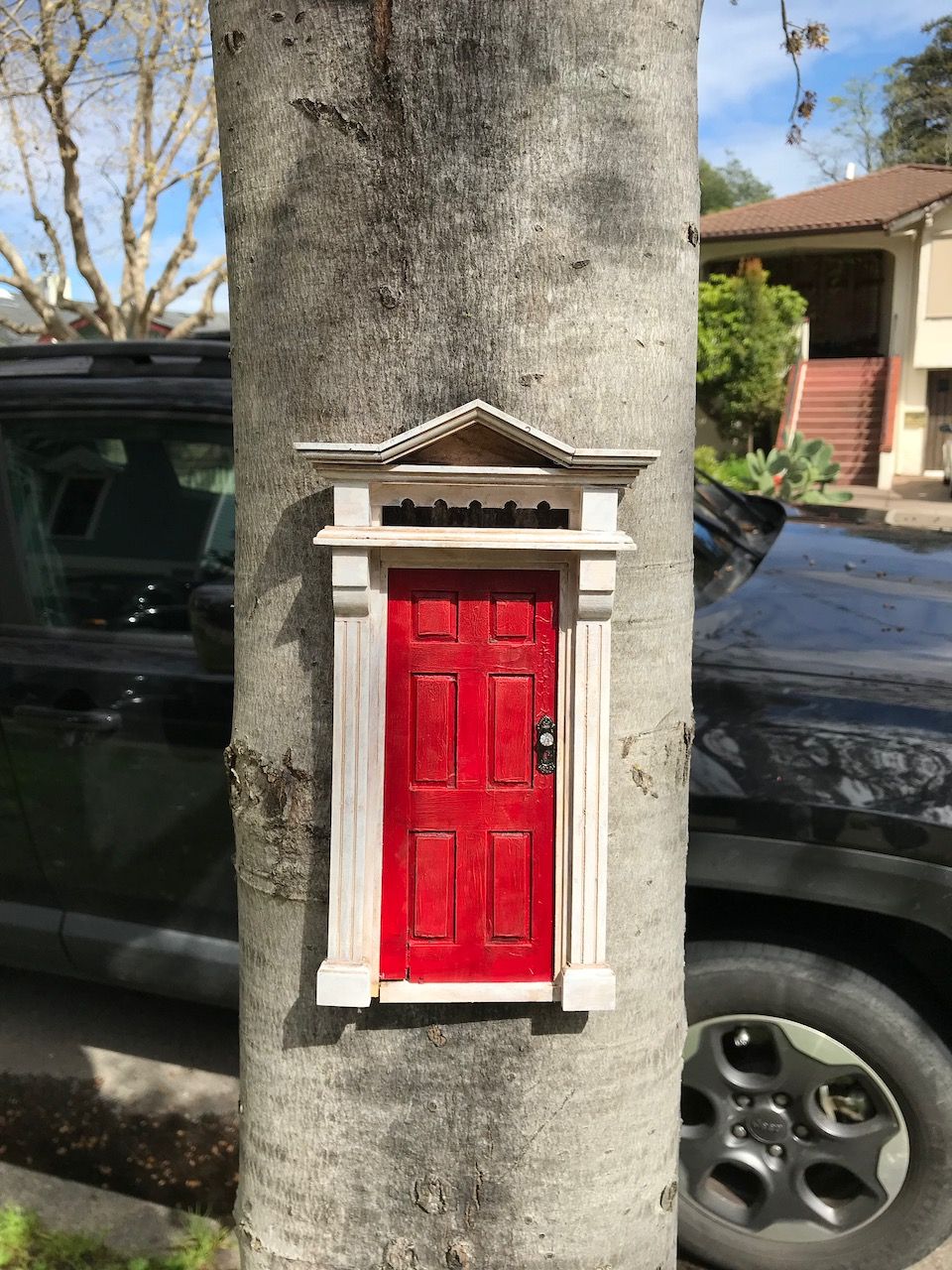
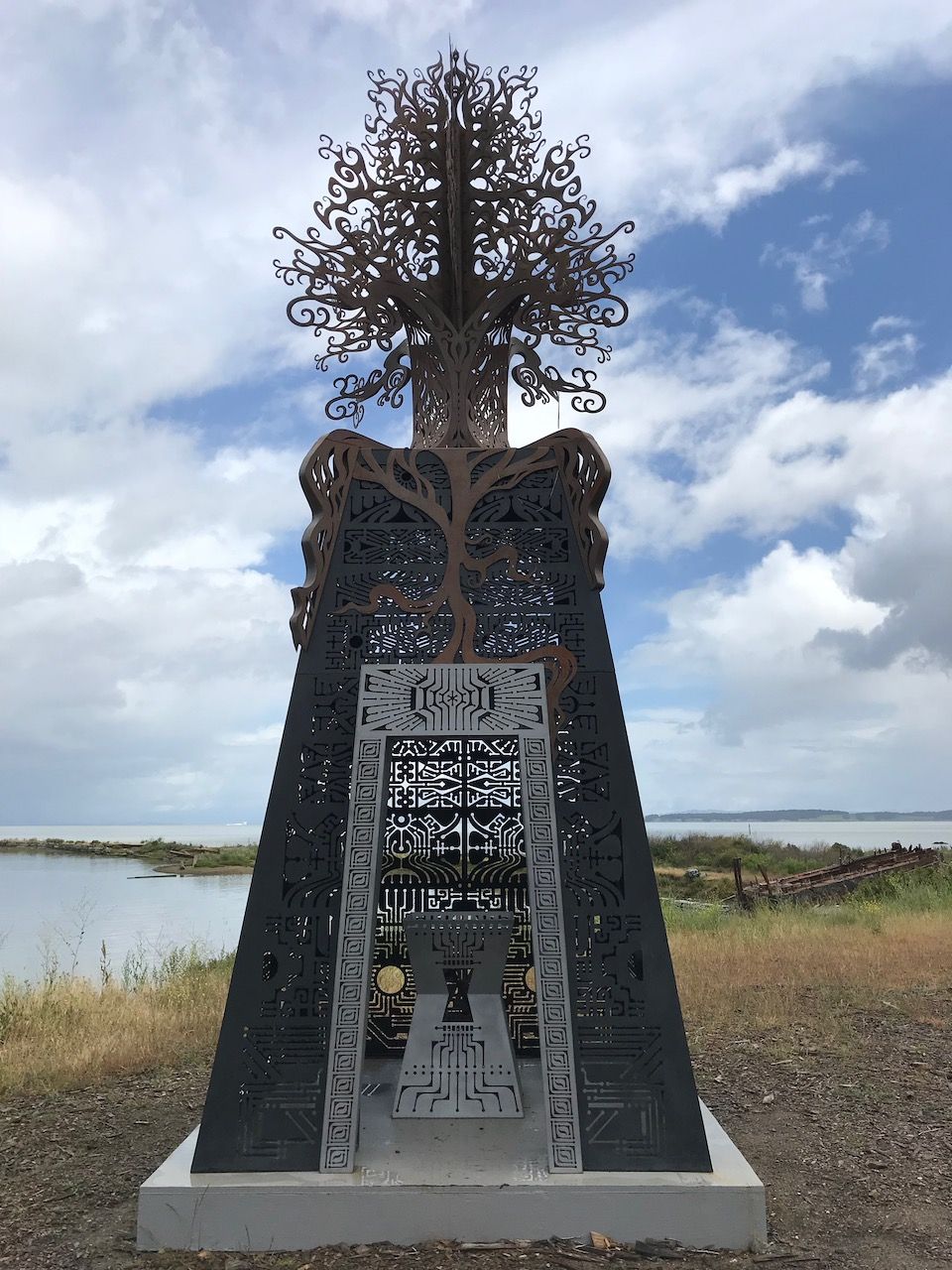
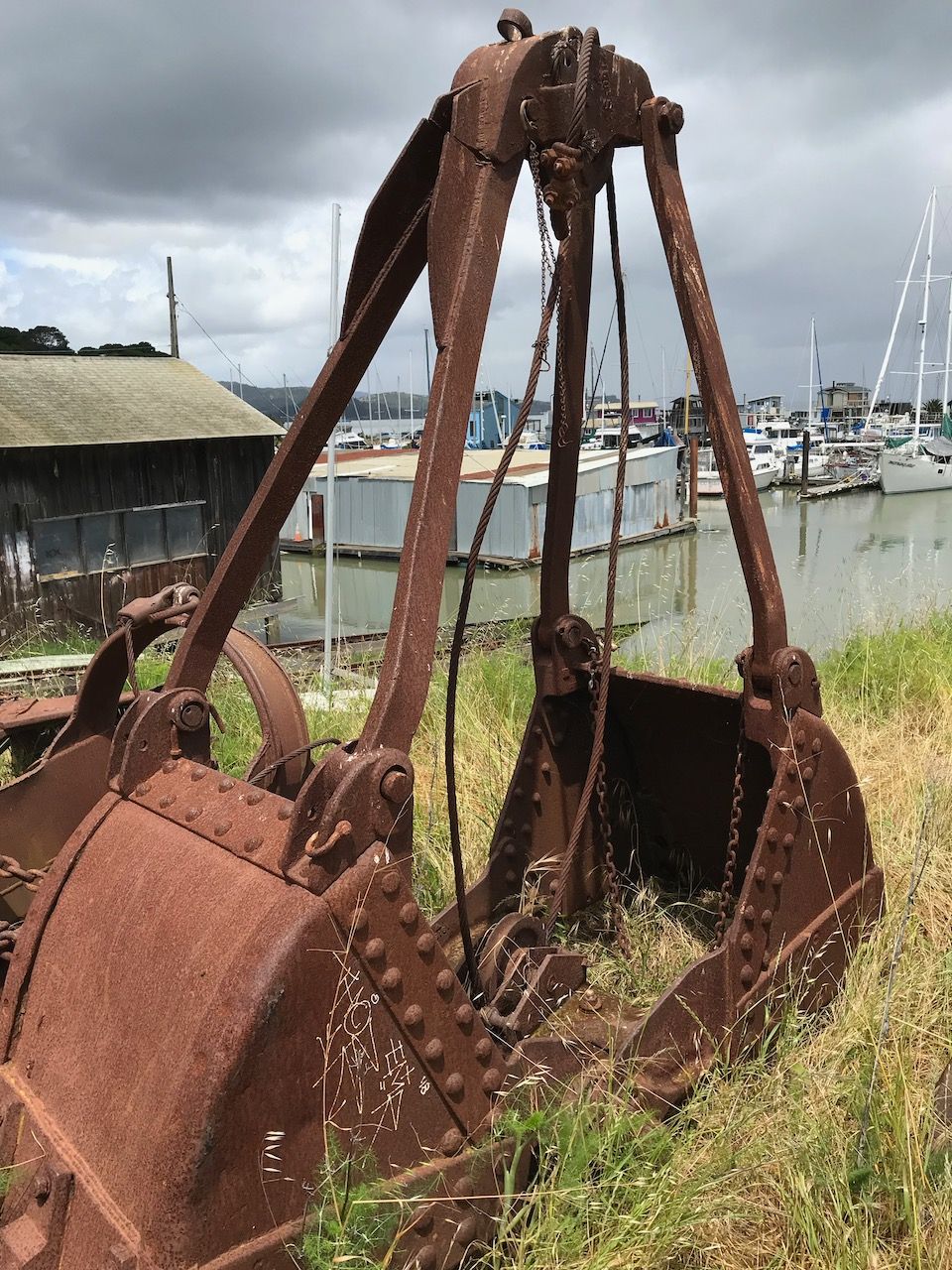
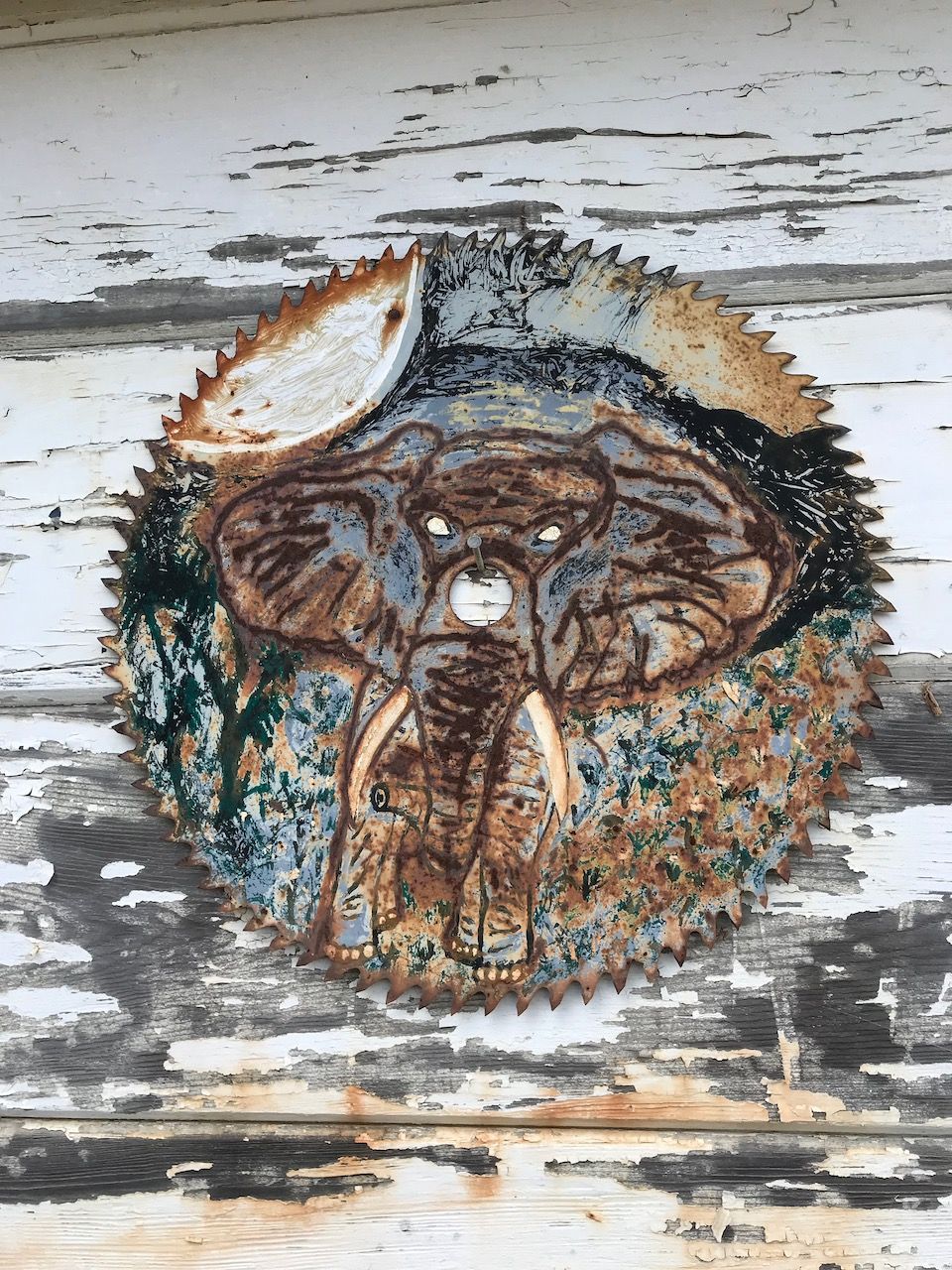
The Foundational Fractal for Wellbeing
by Ken Homer
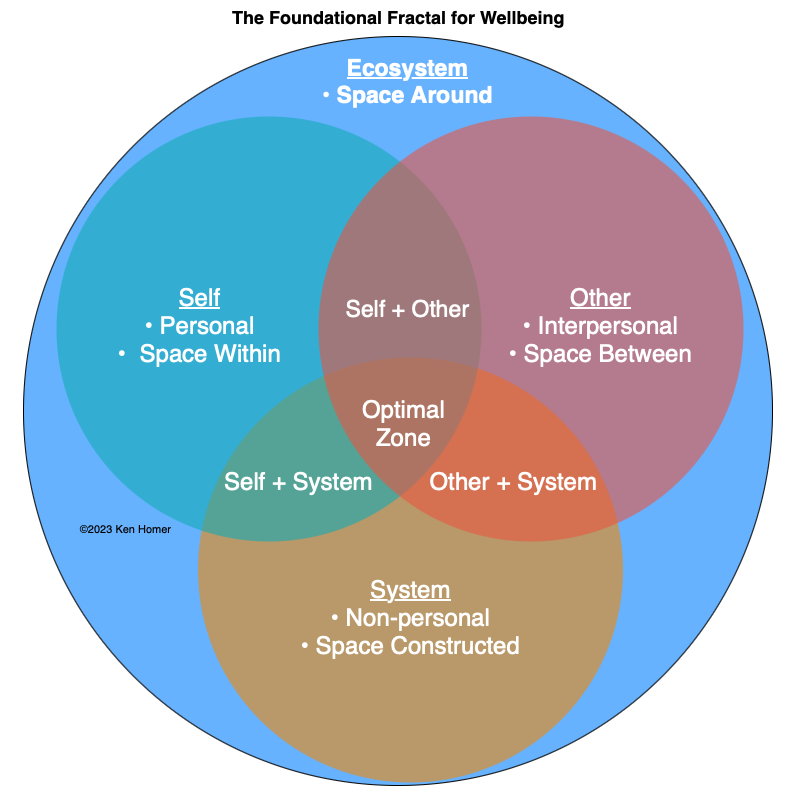
Wellbeing as used in this context, refers to constructing worldviews and adopting practices that allow the full flourishing of people, organizations, communities, wholesome social structures, and the natural (other than human/more than human) world around us.
Every person has a zone of optimal functioning where our skills, talents, and abilities are equal to the task before us and where work can be pleasurable and fulfilling. In the realm of the individual, proper diet, rest, exercise, emotional stability, nurturing relationships, confidence in your competencies, and a sense of purpose are necessary prerequisites for operating in your optimal zone.
In the realm of the interpersonal, people need to negotiate their boundaries and preferences in ways that produce harmonious relationships where the overarching goal is to develop work that contributes to the wellbeing of all four elements in the fractal. Put slightly differently, the objective is to bring out the best in each other while contributing to the wellbeing of the organization, society and the natural world.
In the system domain (which is usually referring to the organizational context) policies and procedures need to be designed and implemented that foster the wellbeing of the people in the organization, the wellbeing of the society in which the organization is situated, and that contributes to bringing about higher levels of wellbeing/flourishing for the larger world as well.
Until recently, most businesses and governments did not feel a need to address ecosystem concerns. The natural world was viewed as resources to be exploited and used freely to address human needs regardless of the impacts of human activities on those ecosystems.
Today, it’s increasingly recognized that us-humans need to realign our activities to reclaim, restore, and regenerate the life support systems of our planet if we wish to remain a viable species.
Will We Survive This?
Crash Course on Collapse and Environment
by Ken Homer
Since the topic of “collapsology” came up on last week’s OGM call, here’s a well-presented systems dynamics view of what we are up against, by Arthur Keller.
Note that while it is scary as hell–something some of us have known for years–and things are accelerating, the only sane response is to look with clear eyes, design for resilience and be willing to help each other.
Climate: Logic and Imagination Together
by Douglass Carmichael
Imagination - How To...
To have a chance against the death-dealing climate challenge, we need an unleashed imagination. Innovation, often expected to “solve” the problem, is too narrow and technical in practice. It deals with technical pliability, not the world of humans, dreams, closer to the world of art, drama, demons, and gods. Imagination is close by, but we act as though we are tied up and prevented from moving into it. We’ve got to get past that and explore the freedom of our minds. Here is a simple proposal: start (this is something to actually do) by writing a sentence that reflects your thinking about climate, maybe a dumb thought. For example:
Could we make locusts that eat up CO2?
What about something like goldfish, same weight as air, that could swim in the atmosphere and live on CO2?
Or simpler:
- CO2 is invisible, but invisible means not in the visible spectrum.
- What if we made some way to see it?
Both of these could turn toward challenging, maybe even helpful, ideas. In each case, the second sentence would never have come to mind without the first.
The point is that imagination is close by, but we act as though we are tied up and prevented from moving there. We’ve got to get past that and explore the freedom of our minds if we are to have a chance against the climate challenges.
New Writing Makes Communication About Climate Harder
With the flood of new writing - blogs, institutes, seminars, international meetings - it is hard to keep up. Each addition means each person has more choices; a new choice is competing with other new choices, and the result is that we are more diffuse, distributed, dispersed from each other. Coherent communication is becoming more difficult.
I am thinking of it this way. We have spent years building the sandcastle of modern society, assuming it is stable, but unaware of the tides that are coming. As the sandcastle falls apart, each grain moves apart from most of the others, and connections become more random.
Not only do oil company executives want to sustain their activity, but so too do “progressives” who are not paying attention to the obvious fact, or what at least ought to be obvious, that their project produces CO2, if only in the form of electricity needed to run their computers. And they want to hold onto their activity to try making it successful without realizing that the connections they create help stabilize society, which sounds good, but makes change harder.
David Brooks has an important article in the New York Times, What if We’re the Bad Guys Here?
He says that the professional class, which had taken over the Democratic Party, is systematically undermining the middle and lower class. This is the kind of article that ought to get more discussion and probably will not. If you put this in the context of Gibbon’s class analysis in Decline and Fall of the Roman Empire, you can see the possibility of a major conflict emerging through the media and the election in 2024.
Toynbee’s Study of History shows how civilizations (not nations) come into conflict as elites and the proletariat diverge in interest. Toynbee’s large scale is complementary to the more detailed texture of the lives of leaders provided by Gibbon’s Decline and Fall. These are the kinds of things we should be reading and discussing. And are not.
How to Speak About Climate Challenge
I am puzzled, along with everyone I know. How to speak in a time of crisis? That is not so hard if it seems we are discussing a crisis we are going through and expect to come out the other side. But if the crisis is probably extinction? To speak pessimism is to scare. To speak optimism is to lie.
Two approaches that seem tolerable and ethical. The first is scenarios: to examine parallel paths into the future, comparing them. But the problem doesn’t go away because we find that the examination in the scenarios process leads to some scenarios that are not plausible and hence rejected, and some seem plausible because objections are not yet fully considered. It is much easier to show that a scenario does not survive facts, but much harder to show that a scenario is going to happen.
The second ethical approach is to develop a single narrative of what is happening without drawing conclusions. “The food system in Burunai [made up] is collapsing.” But not moving on to conclusions like, “Therefore the population dies.” Outs are possible. The problem is the speaker is very likely holding back thoughts already thought of how bad the loss of the food system will be with impossibly large migrations and no substitute crops. Is the speaker lying? I don’t think so, but the speaker will feel corrupted by the process.
Another approach is philosophy. “The major task of philosophy is to learn how to die well.” You were going to die anyway; only the timing is in doubt. The loss of a life is inevitable. So maybe we should just opt out, find some shade, play your guitar, write a poem, and try to make sense of what is happening. Venus became a dead planet through temperature, part of the process of planet formation, sphericalizing until uninhabitable. “This issue confronts us. Do the best and accept the inevitable.”
But maybe staying engaged, we might find a few more tolerable days, and this is worthwhile. It is what we have been doing anyway before COVID and climate. My own preference, so far, is to tell it exactly as facts and reason tell us. No solution proposed scales to the size of the problem. The mass of CO2 (already in the atmosphere produced by several billion vehicles over nearly 200 years, it would require a similar effort to take it out); population; especially when we include other species; the weight of trash, all slowly accumulated; these are all beyond the reach, so far, of our technologies and our politics.
My belief is that hard facts are needed more than soft hopes. And we need radical imagination and radical actions.
Cutting CO2: Who Will Do What and When Will They Do It?
The task is to face how hard this is while looking for actions that can make a significant difference. These both require imagination.
Start with imagining the possibilities for a CEO of a major oil company. She sends out an order to shut down all drilling. The process of sending such an order is obscure to those of us who are not insiders.
I think of some recent interviews with military generals on whether Trump could have launched nuclear weapons. No. The general staff restraints come into play. The order does not get implemented until procedures are in place to prevent damage to equipment and safety measures are in place. An orderly process needs to be invented.
Since stopping the drilling means less crude to the refineries, the refiners must sign off on the shutdown order after making sure the equipment is safe and people and communities are safe. But meanwhile, the refinery operators are looking for alternative sources. As we know, or will soon learn, the big oil companies have been selling off small refiners and drillers in order to “protect” them. If drilling by the main company stops, lots of small drillers are ready to fill the gap.
The process might end when the board fires the CEO who tried to issue the order. Bureaucracies act a little like self-repairing inner tubes, filling any gap with enough goo to maintain the system’s “integrity.”
Next idea? Wait. Let’s see what we have learned and can apply. Perhaps the executive team needs to see that the way things are currently run means that nature is being forced to “leak” its wealth, and we should look at the safety of the current energy regime. And that drilling is actually like a hole in the inner tube we need to plug up.
So, instead of issuing a cease-drilling order, the CEO starts an executive team discussion about the encasing reality of the company’s operations.
That is, society and nature.
Given the way such things work, she probably knows who on the board would support this inquiry, and they might be invited to the staff conversation (uh oh, regulations on what a board member can do and who they can talk to will come into play).
This kind of imagination just starts what has to be a detailed process.
Two Kinds of Imagination Needed.
Habit keeps us in the rut.
“Habit is the great flywheel of society. It keeps the farmer at the plow and the sailor deep at sea.” [William James, Principles of Psychology]
Habit is the enemy of change, while imagination is its companion. Or we will never break out of the iron grip of contemporary habits.
Two kinds of imagination needed: accurate imagination, to discover what is. Experimental imagination, to try out what is new. Thinking of paths forward requires both kinds of imagination. We need to be much tougher and ride this invisible tiger.
We need to build on a solid foundation of good facts. For example, transmission lines are necessary for an electrical option. An example of a bad fact: Replace gas automobiles with EVs, cutting CO2 emissions to zero. But there is no way we can build and replace 8 billion cars. Cost, time, energy, and materials.
Chronicles of Change
Collapse, Resilience, and Humanity's Path Forward
by Ken Homer and Peter Kaminski
Chronicles of Change is a reading list of books assembled by Ken Homer and Peter Kaminski. The books in the list discuss the collapse of societies, as well as insights into how societies adapt, transform, or reinvent themselves in the face of challenges. There are currently 55 books in the list, including The History of the Decline and Fall of the Roman Empire by Edward Gibbon; and a two-volume abridgement by David Churchill Somervell of Toynbee's A Study of History, both mentioned by Doug Carmichael elsewhere in this issue.
Chronicles of Change was created to be a resource for the August 24th OGM call, which will be on the topic of the collapse and reinvention of societies, and also as a longer-term contribution to knowledge and understanding of collapse and resilience. The list is published under CC0 and dedicated into the public domain.
Web version: Chronicles of Change: Collapse, Resilience, and Humanity's Path Forward
To comment, edit, add content, or to download as a spreadsheet, use the Google Sheets version: Chronicles of Change: Collapse, Resilience, and Humanity's Path Forward (spreadsheet).
For information on how to join the August 24th OGM call, email Jerry or Pete, or check the header of the OGM Town Square chat channel.
Put All Your Attention on the Throughline
Mark Dubois and Tom Atlee, h/t Charles Blass
From Tom Atlee's blog: Focusing on the Throughline – Random Communications from an Evolutionary Edge
To be a good boater means learning to read the river. You must read the gargantuan hole that could eat you and your whole craft. You must read the shredder rock just under the surface that’ll rip things apart. You’ve got to see those big obstacles as well as the little things. If you miss the little rock just below the surface or the little eddy, they’ll spin you towards the big threats.
The challenge of being a Class V boater is you have to SEE all of those – and then, put all your attention on the throughline where the current most cleanly flows. The river always goes downstream. So you focus on “Where’s the most benign path through the most powerful flow that I can stay aligned to?”
If I obsess on the obstacles, they become magnets pulling me. Despite their life threatening nature, I still need to focus my attention on the throughline. That is the challenge.
Dare Not to Compare
by Todd Hoskins
I’ve been pondering what it means to be a digital nomad without bringing colonizing energy here in Costa Rica. Over the past few months, I’ve posited that showing respect to the local culture and history may be important when it comes to language and food. Now I’m ready to look at comparisons.
I have been avoiding writing this essay. First, it’s a lesson for me that committing to a series of essays may not always be the best idea. But also, how do I write an essay on comparisons without making comparisons?
Minimizing comparisons has been a mission I’ve been on for a number of years, so it’s no surprise that I found a way to incorporate this on a list of “things to consider.” Bear with me.
To compare is human. It’s part of how we’re wired to understand the world. Neuroscientists are learning more about the precuneus, a region of the parietal cortex in the brain involved in visuospatial integration, that is particularly enlarged in humans. The precuneus may well be the comparison center of the brain.
The precuneus helps you to think about yourself and the world around you. It is like a tour guide that helps you to make sense of all the information that you are taking in. It helps you to compare things, to understand other people, to plan for the future, and to remember the past.
This hidden region is also heavily involved in tool creation and language. So from my vantage point, the precuneus functions as, and symbolizes, the glory and frailty of humanity. We make amazing technology! We talk, and publish, and plan endlessly! We are great at comparing! And we don’t always live and respond in the present moment.

So what’s my deal with comparing? It started with feeling like competitive analyses in the organizational world were counter-productive. And then watching young people with social media feel like they were never measuring up. Then realizing how much of my own understanding was trying to comprehend one thing by setting it next to another.
What if our evolutionary strength is also a weakness?
When I compare, I often fail to see the uniqueness of what I’m encountering. Instead of seeing the tree, or the person, or the business model for what it is, I’m trying to pull up my memories and understanding of what I know and put this being or idea on the “right shelf.” When I’m doing this, I can fail to see what is new or emergent in what is before me.
The etymologies of “precuneus” and the “parietal” cortex–where the precuneus is located–are revealing, with Latin roots meaning “wedge” and “wall.” I would say our comparisons create separation–a wedge or wall to what we are encountering. Sometimes that separation is a necessary part of understanding, but it’s also overused at the expense of experiencing “what is.”
So what does this have to do with living and working abroad? Costa Ricans, or Ticos, love their country and culture. When a visitor or Gringo feels inclined to talk about the US Highway system, or drive-through windows, or maple trees, or cable news networks, you may find an interested audience.
But more often I feel their disappointment, as if they wish to say, “Do you truly see how we live? What we’ve chosen? Or can you only understand our ways of being in contrast to what is North American or European?”
There are far fewer ATM’s and gas stations in Costa Rica.
(See how easy it is to make a comparison? But I can’t help it. My experience is cash and gasoline are available when and where you need it most of the time. When my experience is different, I notice).
It’s common to see a line of cars at the gasolinera or people lined outside the bank. In those lines, strangers often talk, smile, and nod at one another. Rarely is there a complaint, or signs of impatience even. Would they be showing frustration if they knew North American cities had ATM’s on nearly every corner?
I would guess that jealousy would be rare, probably, for most northern conveniences. Ticos mostly enjoy life as it is. They don’t need to hear how it could be better, or even how it is different somewhere else unless they’re asking. So I tell myself,
“Get consent to share stories from your homeland.” And I tell myself, “I don’t have to compare everything all the time.”

mmwire '96
h/t Charles Blass
A blast from the past, courtesy of Charles's scrap paper pile.
“🤓😎 such an innocent time 😂😱”
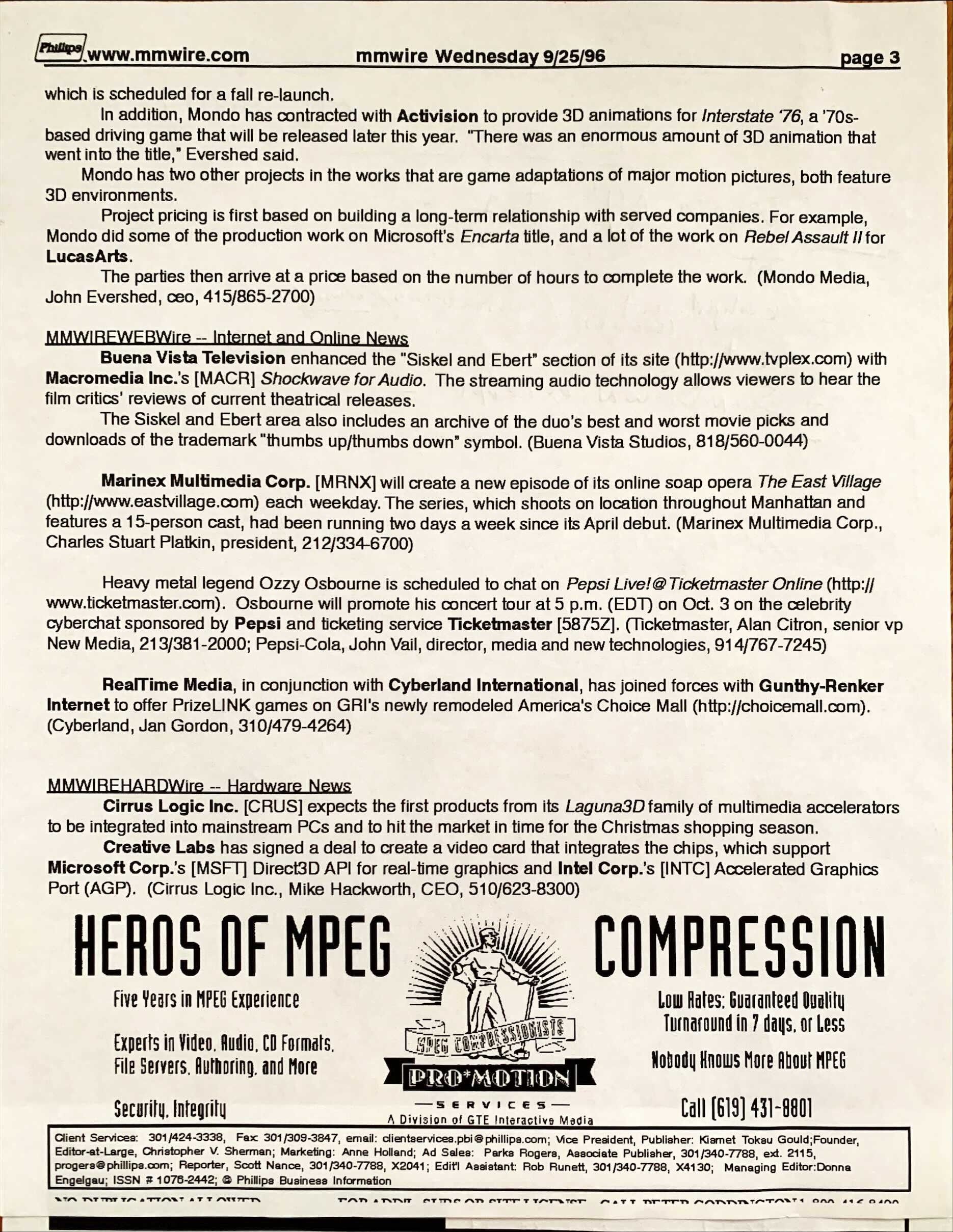
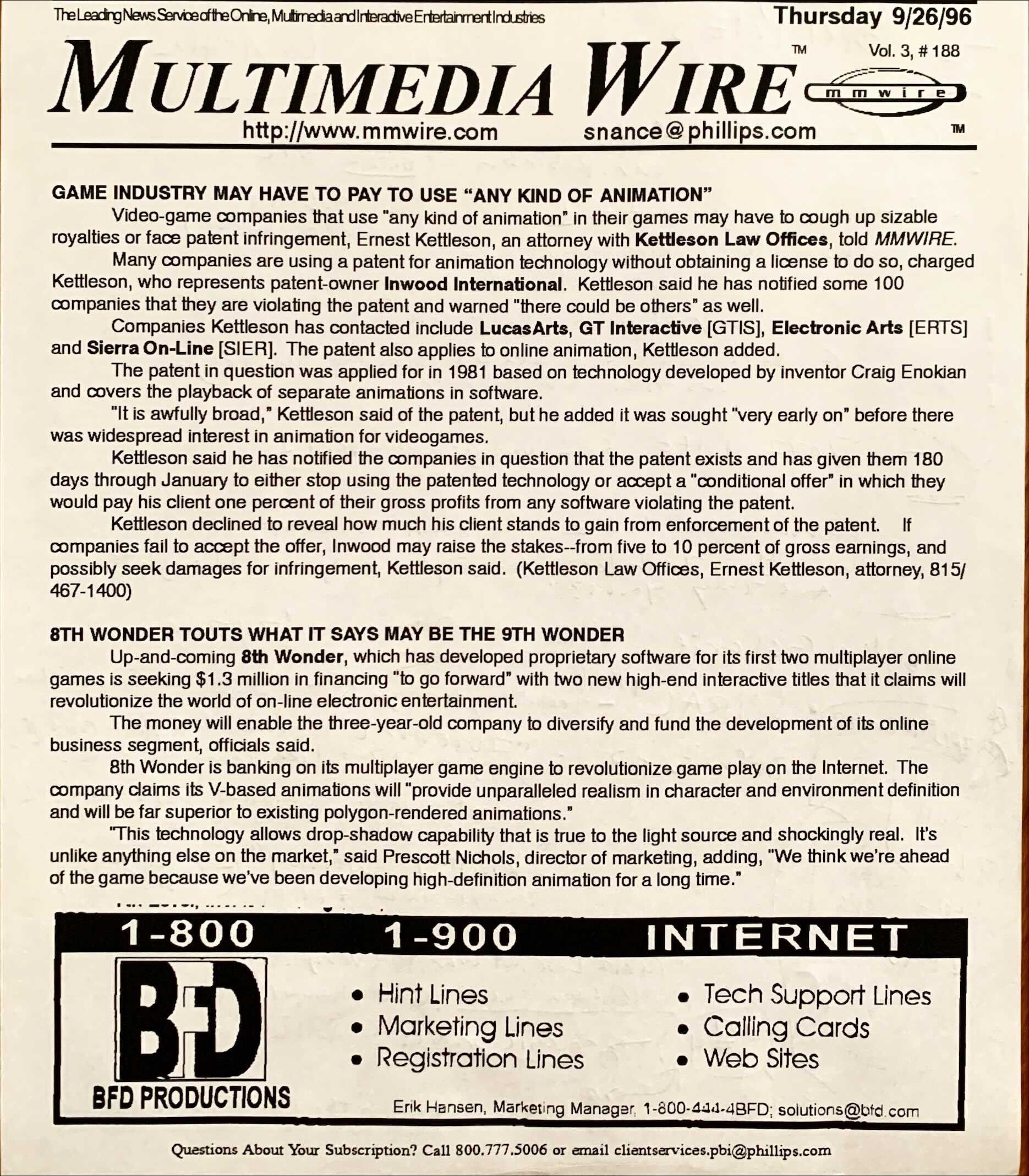
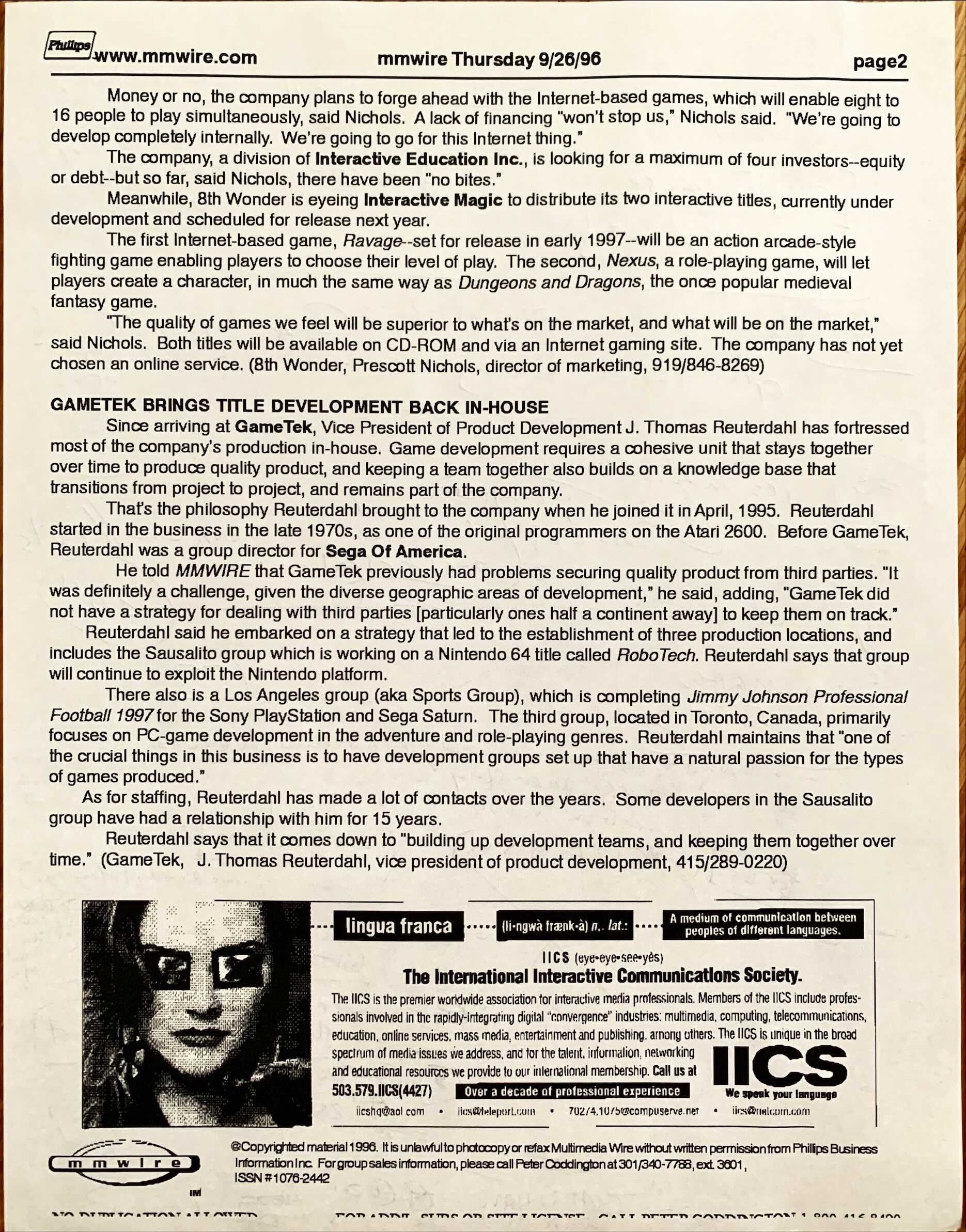
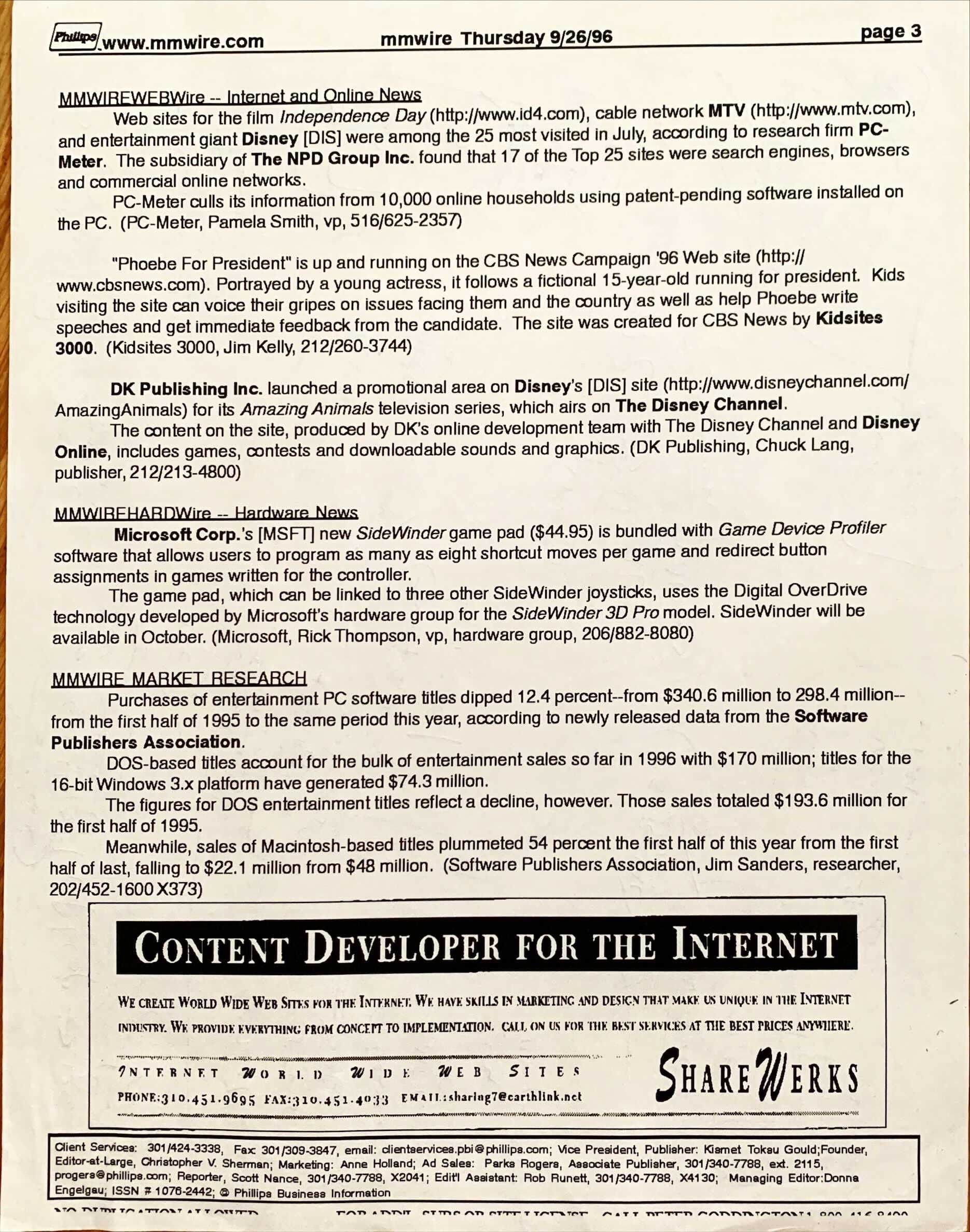
Thank you for reading! The next edition will be published on 6 September 2023. Email Pete with suggested submissions.
Grateful appreciation and many thanks to Vincent Arena, Charles Blass, Douglass Carmichael, Ken Homer, Todd Hoskins, Wendy McLean, and George Pór for their kind contributions to this issue.